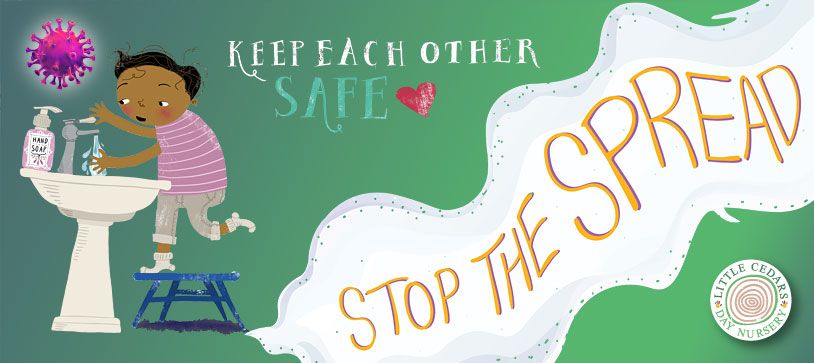
 As parents and caregivers, we understand the incredible value of outdoor play in our children’s development. The fresh air, unstructured exploration, sensory-rich experiences, and social interactions contribute significantly to their holistic growth. However, while we encourage outdoor adventures, safety must remain our top priority. With that in mind, this article provides some essential tips and precautions that will help to safeguard children during outdoor play. The suggestions can be used as a checklist, but parents/caregivers should use it only as a starting point and do their own risk assessments.
As parents and caregivers, we understand the incredible value of outdoor play in our children’s development. The fresh air, unstructured exploration, sensory-rich experiences, and social interactions contribute significantly to their holistic growth. However, while we encourage outdoor adventures, safety must remain our top priority. With that in mind, this article provides some essential tips and precautions that will help to safeguard children during outdoor play. The suggestions can be used as a checklist, but parents/caregivers should use it only as a starting point and do their own risk assessments.
Always Keep an Eye Out
Let’s start with the most obvious; while outdoor play is a wonderful way for children to learn and grow, constant supervision is crucial. Be sure to keep a watchful eye on your child, guiding them away from potential hazards and ensuring their safety at all times.
Set Boundaries and Rules
 Boundaries create a sense of security. Ensure boundaries are understood and that play areas have clear markers. Guide children to understand and respect these boundaries to reduce the risk of children wandering away — and potentially becoming lost.
Boundaries create a sense of security. Ensure boundaries are understood and that play areas have clear markers. Guide children to understand and respect these boundaries to reduce the risk of children wandering away — and potentially becoming lost.
Be Mindful of Traffic Risks
The bustling world outside may often involve traffic hazards that demand our utmost attention when children are under our care. To mitigate this risk, play areas are best located away from access to busy streets, ensuring that children are shielded from the dangers of passing vehicles. Drives where vehicles are parked are also best avoided.
Teach Stranger Safety
Outdoor play can bring encounters with unfamiliar faces. Teach your child about stranger danger and the importance of staying close only to trusted adults. Clear guidelines should be established in regard to possible interactions with strangers.
Stay Clear of Water Dangers
 Children are naturally drawn to water, but it can pose significant risks. Ensure that play areas are far from water bodies, and when near any water source, always provide direct and continuous supervision. Even shallow water can be dangerous for little ones.
Children are naturally drawn to water, but it can pose significant risks. Ensure that play areas are far from water bodies, and when near any water source, always provide direct and continuous supervision. Even shallow water can be dangerous for little ones.
Mind the Terrain
Outdoor terrain can be uneven, and young children are prone to trips and falls. Before allowing your child to play, scan the area for potential trip hazards and clear them away. Teach your child to navigate uneven ground carefully.
Climbing Structures & Fall Prevention
 Although they’re young, children want to explore and will naturally want to climb as they get older. It’s therefore important to teach children a safe approach to climbing. This should include emphasising the importance of staying within safe heights to prevent falls, assisting with climbing technique and, of course, risk-assessing what they should and shouldn’t attempt to climb in the first place.
Although they’re young, children want to explore and will naturally want to climb as they get older. It’s therefore important to teach children a safe approach to climbing. This should include emphasising the importance of staying within safe heights to prevent falls, assisting with climbing technique and, of course, risk-assessing what they should and shouldn’t attempt to climb in the first place.
Sharp Objects & Tools
Children are naturally drawn to exploring their surroundings, which includes investigating potentially dangerous items. Therefore thoroughly inspect new play areas to remove sharp objects, tools, or equipment that could harm curious hands.
Beware Choking Hazards
Children’s natural curiosity when exploring may often lead them to want to put objects in their mouths. This can obviously be extremely dangerous, so ensure vigilance at all times. Inspect play areas to remove small items that could pose choking hazards, ensuring a safe space for our little ones to explore.
Flora & Fauna Hazards
 While exploring nature is exciting, it’s essential to be aware of potential dangers. Educate your child about the dangers of poisonous plants and fungi or insects that could harm them. Encourage them not to touch or eat anything unfamiliar.
While exploring nature is exciting, it’s essential to be aware of potential dangers. Educate your child about the dangers of poisonous plants and fungi or insects that could harm them. Encourage them not to touch or eat anything unfamiliar.
Animal Encounters
Nature’s wonders may include encounters with wildlife. While we might cherish these experiences, we should take precautions to ensure outdoor spaces are free from potentially harmful creatures and educate children on respectful interactions with animals.
Hygiene and Sanitation
 Outdoor exploration sometimes involves contact with dirt and mud. Promote hygiene by ensuring handwashing facilities are readily available and teaching children the importance of cleanliness after outdoor play.
Outdoor exploration sometimes involves contact with dirt and mud. Promote hygiene by ensuring handwashing facilities are readily available and teaching children the importance of cleanliness after outdoor play.
Weather-Appropriate Clothing
Proper attire is crucial for outdoor play. Dress your child in weather-appropriate clothing, including hats and sunscreen for sun protection. When the weather becomes colder, layering of clothing will help to keep children warm in comfort.
Be Prepared for Changing Weather
Weather can be unpredictable, so check the forecast before outdoor playtime. Be prepared with a store of sunscreen when it’s sunny and raincoats or extra layers for when it turns cold and rainy. Suspend play during lightning storms or extreme weather conditions. Be mindful of slipping hazards when it’s wet.
Hydration and Breaks
Outdoor play can be physically demanding, so be sure your child stays hydrated. Provide breaks for rest and water to prevent exhaustion.
Allergen Awareness
Some children may have allergies triggered by outdoor elements. If your child is affected, be sure to maintain an allergen-free environment by regularly cleaning and inspecting play areas and educating friends and relatives about allergy management around your child.
Fire Safety Awareness
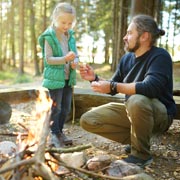 Campfire stories can be delightful and intriguing for children, but we must always prioritise fire safety. If you decide to expose them to it, children must be educated about the potential dangers of fire and always supervised during any fire-related activities. Fostering a responsible understanding around fire safety is paramount.
Campfire stories can be delightful and intriguing for children, but we must always prioritise fire safety. If you decide to expose them to it, children must be educated about the potential dangers of fire and always supervised during any fire-related activities. Fostering a responsible understanding around fire safety is paramount.
Foster a Love for Nature
Encourage your child to appreciate and respect nature. Teach them to observe wildlife from a safe distance and not to disturb animals or their habitats. This helps to keep children and wildlife safe.
In Summary
As parents and caregivers, our priority is the safety and well-being of our children. By using these essential starting points, you can help ensure that your child’s outdoor play is not only fun and educational but also safe and secure. At Little Cedars Nursery, Streatham, we share your commitment to providing a safe environment for outdoor exploration. Our dedicated staff, thoughtfully designed play areas, and safety-conscious practices further enhance the outdoor experiences of children under our care. Together, therefore, we can create enduring memories of outdoor adventures that are as secure as they are captivating, enriching and fun for our little ones.
Little Cedars Nursery: High-Quality Childcare in Streatham
A Childcare Nursery & Preschool in Streatham, near Furzedown, Tooting, Balham, Norbury & Colliers Wood

 If you are looking for the best nurseries or preschools in the Streatham area, do consider Little Cedars. We offer an outstanding weekday childcare service for babies, toddlers, and preschoolers under five. We’re also conveniently close to those living or working in Streatham Hill, Streatham Park, Streatham Common, Furzedown, Tooting, Tooting Bec, Tooting Broadway, Tooting Common, Balham, Norbury and Colliers Wood.
If you are looking for the best nurseries or preschools in the Streatham area, do consider Little Cedars. We offer an outstanding weekday childcare service for babies, toddlers, and preschoolers under five. We’re also conveniently close to those living or working in Streatham Hill, Streatham Park, Streatham Common, Furzedown, Tooting, Tooting Bec, Tooting Broadway, Tooting Common, Balham, Norbury and Colliers Wood.
To apply for a childcare place, arrange a guided tour of the setting, or ask us any questions, please simply choose an option to contact us below:
Also: See Our Indoor Safety Guide
The above is a useful companion article to our earlier guide, 20 Ways to Childproof Your Home, which concentrates mostly on indoor safety. Click the bold blue link for more information.

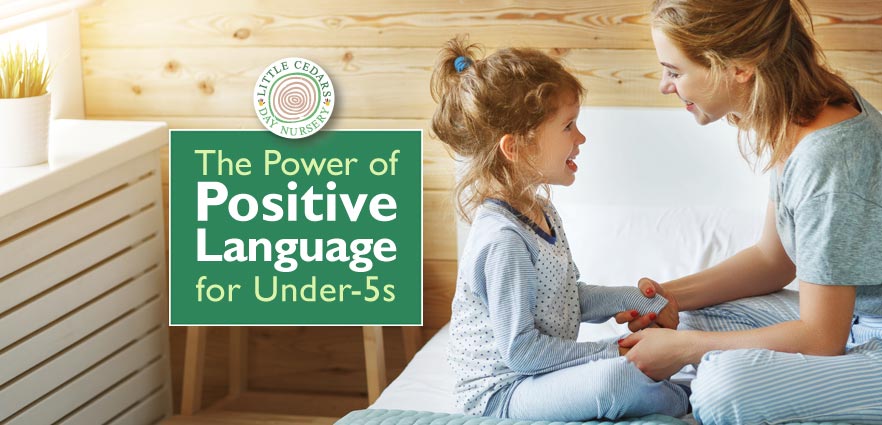
 In today’s post, we explore the benefits of using positive language around under-fives. All too often, it’s tempting to say ‘No!’, ‘Stop that!’ or even ‘Don’t Eat That!’ and similar around little ones. This is particularly true when you want them to cease the offending activity urgently or are simply exhausted if it’s been a challenging day. There are good reasons for such negative commands, of course, not least that of their safety in many cases. However, such commands can sound stern and cause stress for the little ones. What’s more, if a child hears too much negative language and cannot understand why they’re not allowed to do a particular thing, problems can begin to arise and, indeed, the issue can become insidious. It may even result in worsening behaviour. Let’s explore, therefore, the issues around negative language and the simple solution that’s available in the form of positive language.
In today’s post, we explore the benefits of using positive language around under-fives. All too often, it’s tempting to say ‘No!’, ‘Stop that!’ or even ‘Don’t Eat That!’ and similar around little ones. This is particularly true when you want them to cease the offending activity urgently or are simply exhausted if it’s been a challenging day. There are good reasons for such negative commands, of course, not least that of their safety in many cases. However, such commands can sound stern and cause stress for the little ones. What’s more, if a child hears too much negative language and cannot understand why they’re not allowed to do a particular thing, problems can begin to arise and, indeed, the issue can become insidious. It may even result in worsening behaviour. Let’s explore, therefore, the issues around negative language and the simple solution that’s available in the form of positive language.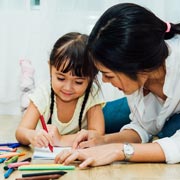 Sometimes, though, constantly hearing ‘no’ can spark tantrums, particularly if a child doesn’t understand the reason they are not allowed to do something. They can feel particularly frustrated when they receive a succession of negative commands and, in the end, may feel they simply can’t do anything right. This can lead not only to stress for them, but also to possible low self-esteem. Furthermore, if they hear ‘no’ and other negative language too often, they can begin to ‘tune out’ to it. They could then go on to develop challenging behaviour due to this, their confusion and frustration. Stress levels can then rise for the parent too, the infant can pick up on this and it can become a real vicious circle. It doesn’t have to be that way, though …
Sometimes, though, constantly hearing ‘no’ can spark tantrums, particularly if a child doesn’t understand the reason they are not allowed to do something. They can feel particularly frustrated when they receive a succession of negative commands and, in the end, may feel they simply can’t do anything right. This can lead not only to stress for them, but also to possible low self-esteem. Furthermore, if they hear ‘no’ and other negative language too often, they can begin to ‘tune out’ to it. They could then go on to develop challenging behaviour due to this, their confusion and frustration. Stress levels can then rise for the parent too, the infant can pick up on this and it can become a real vicious circle. It doesn’t have to be that way, though …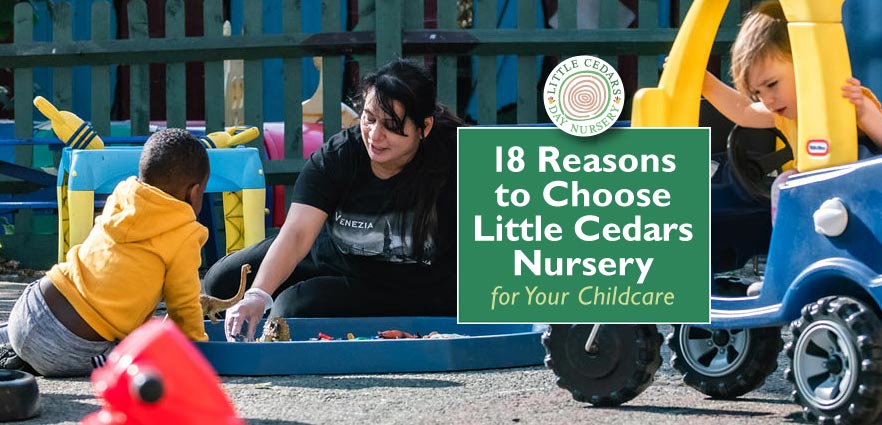
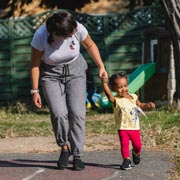 Independent feedback from other parents is worth its weight in gold. In the last five years, Little Cedars has received only 5-star reviews on Google and Facebook. That’s top marks, consistently for 5 years running.* Comments that accompanied these independent reviews were equally compelling — here are just a few examples:
Independent feedback from other parents is worth its weight in gold. In the last five years, Little Cedars has received only 5-star reviews on Google and Facebook. That’s top marks, consistently for 5 years running.* Comments that accompanied these independent reviews were equally compelling — here are just a few examples: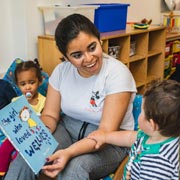 Little Cedars is a warm, welcoming and nurturing environment. To the babies and children, it very much becomes a home-from-home where they feel safe, valued, cared for and all with wonderful, close relationships with both peers and our childcare professionals. It’s also a place of immense fun where little ones are happy, stimulated and nurtured in order to bring out the best in them.
Little Cedars is a warm, welcoming and nurturing environment. To the babies and children, it very much becomes a home-from-home where they feel safe, valued, cared for and all with wonderful, close relationships with both peers and our childcare professionals. It’s also a place of immense fun where little ones are happy, stimulated and nurtured in order to bring out the best in them.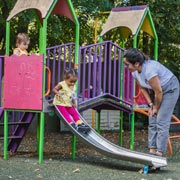 Little Cedars Nursery is extremely well resourced and equipped, both inside and out.
Little Cedars Nursery is extremely well resourced and equipped, both inside and out. 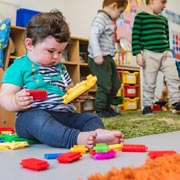 If your 2-year-old is eligible for the Government’s free childcare scheme for this age group, rest assured that Little Cedars Day Nursery supports them and this can potentially give your little one 15 free hours of childcare per week for as many as 38 weeks of the year. That’s 570 free childcare hours per year for your 2-year-old!
If your 2-year-old is eligible for the Government’s free childcare scheme for this age group, rest assured that Little Cedars Day Nursery supports them and this can potentially give your little one 15 free hours of childcare per week for as many as 38 weeks of the year. That’s 570 free childcare hours per year for your 2-year-old!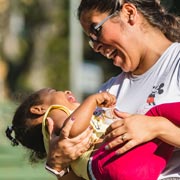 A Key Person is assigned to each child at Little Cedars Nursery. This is an early years practitioner who ensures that the child’s needs are being catered for and that their care at the setting is tailored to them as an individual. They help children settle in when they first join the nursery and build strong relationships with both the child and the parents. They are therefore usually the natural and key point of contact at the nursery.
A Key Person is assigned to each child at Little Cedars Nursery. This is an early years practitioner who ensures that the child’s needs are being catered for and that their care at the setting is tailored to them as an individual. They help children settle in when they first join the nursery and build strong relationships with both the child and the parents. They are therefore usually the natural and key point of contact at the nursery.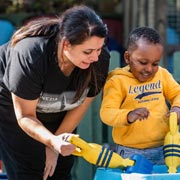 We have a very special team at Little Cedars Nursery. Every one of them has been hand picked to ensure they are the perfect fit for the nursery and for the children therein. They’re warm, natural carers who will form wonderful relationships with children and bring out the very best in them. They become the children’s safe, familiar and friendly faces at the setting as well as facilitating top-notch learning and early years education. They also ensure every child is happy and is having fun whilst under our care.
We have a very special team at Little Cedars Nursery. Every one of them has been hand picked to ensure they are the perfect fit for the nursery and for the children therein. They’re warm, natural carers who will form wonderful relationships with children and bring out the very best in them. They become the children’s safe, familiar and friendly faces at the setting as well as facilitating top-notch learning and early years education. They also ensure every child is happy and is having fun whilst under our care.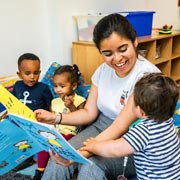 At Little Cedars we do so much more than simply look after babies, toddlers and under-fives. We educate and nurture them too. In fact, we ensure that our little ones achieve personal bests in all 7 areas of
At Little Cedars we do so much more than simply look after babies, toddlers and under-fives. We educate and nurture them too. In fact, we ensure that our little ones achieve personal bests in all 7 areas of 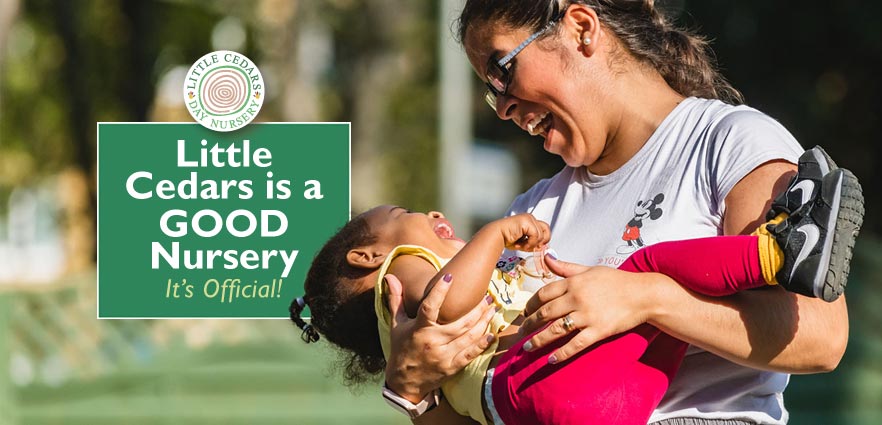
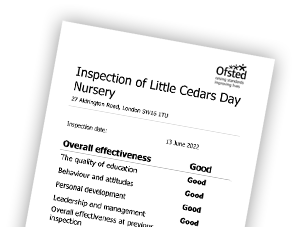 Here’s how Ofsted rate Little Cedars Nursery:
Here’s how Ofsted rate Little Cedars Nursery: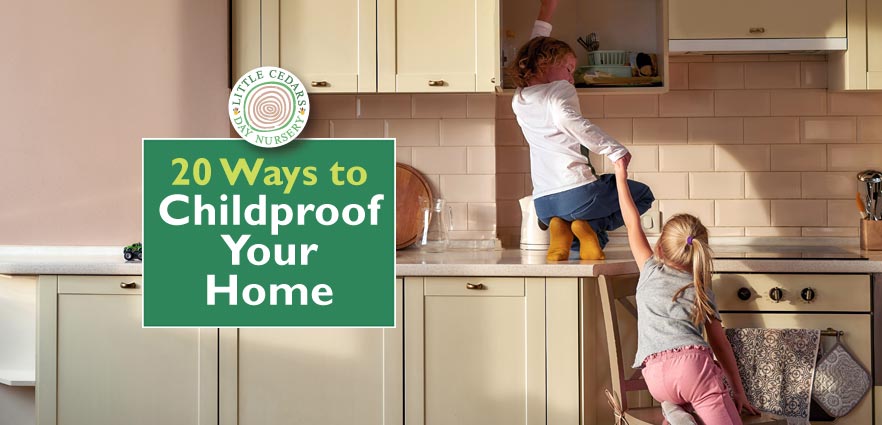
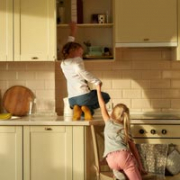 Once babies can crawl, they’re well on their way to becoming toddlers. Then, in no time at all, they can suddenly become fully mobile, able to climb and even be out of your sight in just seconds. With this new mobility comes exploration, the potential for danger and even possible injury. With that in mind, we bring you 20 ways to begin childproofing your home to keep little ones safer and further from harm’s way.
Once babies can crawl, they’re well on their way to becoming toddlers. Then, in no time at all, they can suddenly become fully mobile, able to climb and even be out of your sight in just seconds. With this new mobility comes exploration, the potential for danger and even possible injury. With that in mind, we bring you 20 ways to begin childproofing your home to keep little ones safer and further from harm’s way.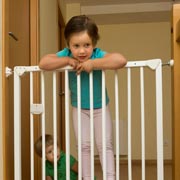 Safety gates, strategically placed around the home, are a great way to keep your little one confined to a safer, controlled area. There are lots of different types available, whether new or second-hand, but make sure they’re made to UK safety standards. Some are suitable for doorways and others for stairs. Using safety gates to keep young children away from stairs, kitchens and other hazardous places really is a no-brainer and a great place to start with your childproofing exercise.
Safety gates, strategically placed around the home, are a great way to keep your little one confined to a safer, controlled area. There are lots of different types available, whether new or second-hand, but make sure they’re made to UK safety standards. Some are suitable for doorways and others for stairs. Using safety gates to keep young children away from stairs, kitchens and other hazardous places really is a no-brainer and a great place to start with your childproofing exercise.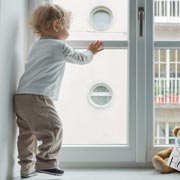 Clear floor-to-ceiling glass is also a hazard once children are mobile. Therefore such glass, whether part of a window, patio door, glass partition or conservatory should ideally not be clear all the way down. Otherwise, an unsuspecting child — or even adult — could find themselves running straight through what they thought was an opening. An easy way to ensure glass can be seen as a barrier is to use strategically placed stickers dotted around on the glass. These could be fun and attractive, for example little flower or butterfly stickers. Alternatively, you can even buy modern-looking ‘frosting’ strips that, when applied in one or more horizontal stripes or shapes at an appropriate height, will make clear glass more visible to you and your child. Guards are, of course, another possible temporary option.
Clear floor-to-ceiling glass is also a hazard once children are mobile. Therefore such glass, whether part of a window, patio door, glass partition or conservatory should ideally not be clear all the way down. Otherwise, an unsuspecting child — or even adult — could find themselves running straight through what they thought was an opening. An easy way to ensure glass can be seen as a barrier is to use strategically placed stickers dotted around on the glass. These could be fun and attractive, for example little flower or butterfly stickers. Alternatively, you can even buy modern-looking ‘frosting’ strips that, when applied in one or more horizontal stripes or shapes at an appropriate height, will make clear glass more visible to you and your child. Guards are, of course, another possible temporary option.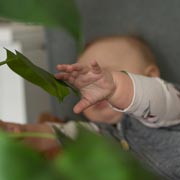 Whether they’re in the kitchen, on the landing, under the stairs or elsewhere, cupboards can represent a number of possible hazards to children. Fingers can be hurt if shut in the doors or near the hinges and the cupboards themselves can contain any number of dangerous things. Therefore, it’s wise to obtain some childproof locks, latches or catches for cupboard doors that you don’t want your child to be able to open. These are often simple, easy to affix (and remove when children are older) and can be inexpensive if you shop around.
Whether they’re in the kitchen, on the landing, under the stairs or elsewhere, cupboards can represent a number of possible hazards to children. Fingers can be hurt if shut in the doors or near the hinges and the cupboards themselves can contain any number of dangerous things. Therefore, it’s wise to obtain some childproof locks, latches or catches for cupboard doors that you don’t want your child to be able to open. These are often simple, easy to affix (and remove when children are older) and can be inexpensive if you shop around. Similarly, ensure that entrance/exit doors throughout your home are secure where they need to be. Front doors, doors to gardens, balconies and patios all need to be particularly well secured from access by young children, whether through locks, latches or specialist childproofing mechanisms (there are lots available on the market). Similarly, windows need to be secure and that’s never more true than when there’s a nasty drop the other side.
Similarly, ensure that entrance/exit doors throughout your home are secure where they need to be. Front doors, doors to gardens, balconies and patios all need to be particularly well secured from access by young children, whether through locks, latches or specialist childproofing mechanisms (there are lots available on the market). Similarly, windows need to be secure and that’s never more true than when there’s a nasty drop the other side.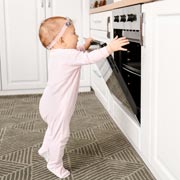 Everything with a motor or moving parts is a potential hazard to small children. The obvious items to keep well beyond their reach are tools like drills and saws along with household appliances like vacuums, food mixers and coffee-makers. However, larger things like washing machines, tumble driers, dishwashers and any appliance with a door that they could climb into are also potentially very dangerous for little ones. It may even take a combination of precautions to keep children safe from such hazards.
Everything with a motor or moving parts is a potential hazard to small children. The obvious items to keep well beyond their reach are tools like drills and saws along with household appliances like vacuums, food mixers and coffee-makers. However, larger things like washing machines, tumble driers, dishwashers and any appliance with a door that they could climb into are also potentially very dangerous for little ones. It may even take a combination of precautions to keep children safe from such hazards.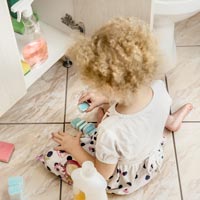 Another reason to keep little ones out of cupboards and certain areas of the home is to keep them safe from hazardous products. Some things will be poisonous and others may be corrosive. Dishwasher and laundry pods need to be stored well out of children’s reach as do medicines, cleaning products and DIY items like paint, solvents and glues. Any of these could prove fatal if they get into little hands. Remember, too, that children learn to climb, so even cupboards high up need to be secured.
Another reason to keep little ones out of cupboards and certain areas of the home is to keep them safe from hazardous products. Some things will be poisonous and others may be corrosive. Dishwasher and laundry pods need to be stored well out of children’s reach as do medicines, cleaning products and DIY items like paint, solvents and glues. Any of these could prove fatal if they get into little hands. Remember, too, that children learn to climb, so even cupboards high up need to be secured. Smoke alarms suitably located around the home are one of the most basic precautions any parent or carer can make. Countless lives are saved each year due to smoke alarms. Sadly, though, many are also lost due to them not being present or due to batteries having expired. So, ensure that smoke alarms are ideally in every room as well as being in hallways, stairwells and so on. Also test them regularly to ensure batteries are in good, working order.
Smoke alarms suitably located around the home are one of the most basic precautions any parent or carer can make. Countless lives are saved each year due to smoke alarms. Sadly, though, many are also lost due to them not being present or due to batteries having expired. So, ensure that smoke alarms are ideally in every room as well as being in hallways, stairwells and so on. Also test them regularly to ensure batteries are in good, working order.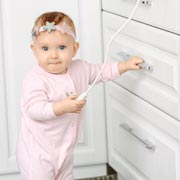 For similar reasons, it’s also wise to keep electrical wire cords tidy and out of reach of little ones. If they were to pull a kettle lead or trip over an electric iron lead, for example, the potential outcomes do not bear thinking about. Cords on telephones and electrical appliances are also choking hazards, of course. So, keep them out of harm’s way i.e. well out of grabbing and tripping distance.
For similar reasons, it’s also wise to keep electrical wire cords tidy and out of reach of little ones. If they were to pull a kettle lead or trip over an electric iron lead, for example, the potential outcomes do not bear thinking about. Cords on telephones and electrical appliances are also choking hazards, of course. So, keep them out of harm’s way i.e. well out of grabbing and tripping distance. Dangling pull-cords on window blinds have, regrettably, been the cause of several deaths around the world. If they’re dangling down, small children could get these wrapped around their necks and potentially strangle themselves. Any toggle on the end of the cords can also be a choking hazard. So, if you have any of these in your home, ensure they are tied safely out of reach, ideally using the safety fitments that often come with new blinds, or are available inexpensively. The same kind of approach may also be needed in rooms where the electrical light, shower or extractor switch comes in a pull-cord form.
Dangling pull-cords on window blinds have, regrettably, been the cause of several deaths around the world. If they’re dangling down, small children could get these wrapped around their necks and potentially strangle themselves. Any toggle on the end of the cords can also be a choking hazard. So, if you have any of these in your home, ensure they are tied safely out of reach, ideally using the safety fitments that often come with new blinds, or are available inexpensively. The same kind of approach may also be needed in rooms where the electrical light, shower or extractor switch comes in a pull-cord form. Heat sources are a terrible hazard for children and adults alike. However, little ones will seldom realise the hazards, so parents and guardians need to ensure that all heat sources are kept well out of children’s reach. Examples include hair straighteners, irons, kettles, sandwich makers, pots and pans that have been on the cooker, and so on. With regard to cookers, hobs, grills, and ovens, it’s the children that need to be kept away from them, of course. Even a switched-off oven can still have a door that’s retained enough heat to burn little hands. A combination of several of the precautions outlined in this page may therefore help to make complete safety feasible in the kitchen and anywhere there are appliances that heat up.
Heat sources are a terrible hazard for children and adults alike. However, little ones will seldom realise the hazards, so parents and guardians need to ensure that all heat sources are kept well out of children’s reach. Examples include hair straighteners, irons, kettles, sandwich makers, pots and pans that have been on the cooker, and so on. With regard to cookers, hobs, grills, and ovens, it’s the children that need to be kept away from them, of course. Even a switched-off oven can still have a door that’s retained enough heat to burn little hands. A combination of several of the precautions outlined in this page may therefore help to make complete safety feasible in the kitchen and anywhere there are appliances that heat up. Radiators, heaters and, of course, fires, stoves and any other heat source in fireplaces are terribly dangerous things for children. Therefore radiator covers, fire guards, permanent vigilance and a good dose of common sense should enable parents and carers to keep children well away from such heat sources.
Radiators, heaters and, of course, fires, stoves and any other heat source in fireplaces are terribly dangerous things for children. Therefore radiator covers, fire guards, permanent vigilance and a good dose of common sense should enable parents and carers to keep children well away from such heat sources.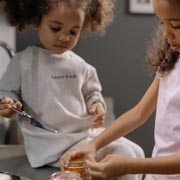 Scissors, knives, razors, needles, hand tools like saws and screwdrivers must be locked well away and never left lying around. Even pens and pencils are sharp and dangerous around eyes, when you think about it. So, it’s imperative that parents/guardians are vigilant and supervise at all times when it comes to anything sharp or pointed.
Scissors, knives, razors, needles, hand tools like saws and screwdrivers must be locked well away and never left lying around. Even pens and pencils are sharp and dangerous around eyes, when you think about it. So, it’s imperative that parents/guardians are vigilant and supervise at all times when it comes to anything sharp or pointed. Vigilance will still be needed, however, as bumpers can only go so far.
Vigilance will still be needed, however, as bumpers can only go so far.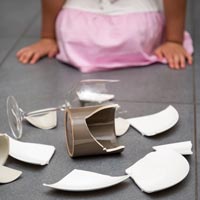 Table cloths and table runners may look attractive but are another hazard around children, albeit a less obvious one. They look innocuous enough, but should a child grab one end and walk or fall way, they could end up with all sorts of things crashing upon them. When you think about what goes on tables (e.g. glassware, candles, china etc.), this could potentially be disastrous. So, the best advice is to completely avoid their use around young children and certainly never to allow any edges to hang down at ‘grabbing’ height.
Table cloths and table runners may look attractive but are another hazard around children, albeit a less obvious one. They look innocuous enough, but should a child grab one end and walk or fall way, they could end up with all sorts of things crashing upon them. When you think about what goes on tables (e.g. glassware, candles, china etc.), this could potentially be disastrous. So, the best advice is to completely avoid their use around young children and certainly never to allow any edges to hang down at ‘grabbing’ height.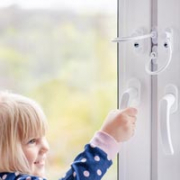 Supervised access to the garden or other outdoor space or environment is good for even the youngest of children. However, they must never be allowed to just wander into the garden or street unaccompanied (of course). There are countless dangers outside, including poisonous plants, stranger danger, cars and many other hazards. Even in your own garden there are usually hazards, from steps, inclines and level drops to dangerous garden tools plus another type of hazard we’ll see in our last tip below. Therefore exit points in the property need to be secure (see tip #4 above) and supervised at all times around the very young.
Supervised access to the garden or other outdoor space or environment is good for even the youngest of children. However, they must never be allowed to just wander into the garden or street unaccompanied (of course). There are countless dangers outside, including poisonous plants, stranger danger, cars and many other hazards. Even in your own garden there are usually hazards, from steps, inclines and level drops to dangerous garden tools plus another type of hazard we’ll see in our last tip below. Therefore exit points in the property need to be secure (see tip #4 above) and supervised at all times around the very young.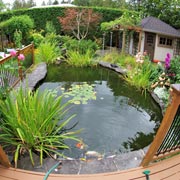 Gardens often have ponds or, if you’re lucky enough, hot tubs and even swimming pools. These are all hazards to young children. Even a puddle is a potential drowning hazard to the very young. It’s the same indoors, with baths and even basins of water being potential drowning hazards. So, once again, parents and any supervising adults need to be doing just that, i.e. supervising anywhere there is water. For different reasons, that’s even more the case around hot water, of course, and anywhere a child could potentially splash or pour water near electrics.
Gardens often have ponds or, if you’re lucky enough, hot tubs and even swimming pools. These are all hazards to young children. Even a puddle is a potential drowning hazard to the very young. It’s the same indoors, with baths and even basins of water being potential drowning hazards. So, once again, parents and any supervising adults need to be doing just that, i.e. supervising anywhere there is water. For different reasons, that’s even more the case around hot water, of course, and anywhere a child could potentially splash or pour water near electrics.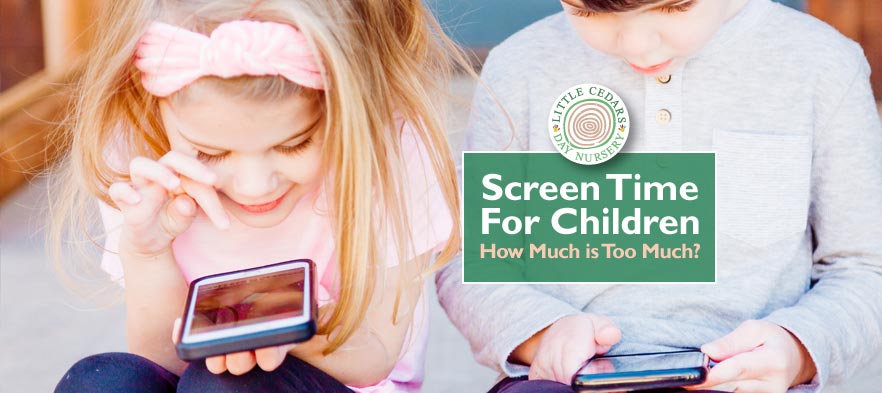
 Recent studies show that use of connected screens and devices by children, including under-fives, is growing fast. The pandemic appears to have increased kids’ screen use too, as children have spent more time indoors and less time playing ‘in person’ with friends.
Recent studies show that use of connected screens and devices by children, including under-fives, is growing fast. The pandemic appears to have increased kids’ screen use too, as children have spent more time indoors and less time playing ‘in person’ with friends. Over 75% of children under five have access to a connected device, with up to 60% of preschoolers actually owning their own.
Over 75% of children under five have access to a connected device, with up to 60% of preschoolers actually owning their own. “Parents have always played a huge role in curating what [under-fives] consume and how their time is spent, but toddlers are now confidently navigating digital platforms for themselves, and using touchscreen devices with purpose and determination.” (Childwise)
“Parents have always played a huge role in curating what [under-fives] consume and how their time is spent, but toddlers are now confidently navigating digital platforms for themselves, and using touchscreen devices with purpose and determination.” (Childwise) that the ‘RF wireless radiation’ emitted by Wi-Fi connected screens and devices may carry potential health risks particularly, they argue, for pregnant women, their unborn foetuses and the young. The very young, of course, have brains that are still at a critical development stage. For this reason, the experts concerned advocate that access to devices like mobile phones should be limited, removed from children’s bedrooms at night or, at the very least, placed in Flight Mode when possible. Using devices wired instead of using Wi-Fi apparently reduces risks. Use of them in hands-free mode is another useful approach, so that the devices are not so close to youngsters’ heads. We’re not experts ourselves, but these measures seem like sensible precautions.
that the ‘RF wireless radiation’ emitted by Wi-Fi connected screens and devices may carry potential health risks particularly, they argue, for pregnant women, their unborn foetuses and the young. The very young, of course, have brains that are still at a critical development stage. For this reason, the experts concerned advocate that access to devices like mobile phones should be limited, removed from children’s bedrooms at night or, at the very least, placed in Flight Mode when possible. Using devices wired instead of using Wi-Fi apparently reduces risks. Use of them in hands-free mode is another useful approach, so that the devices are not so close to youngsters’ heads. We’re not experts ourselves, but these measures seem like sensible precautions. While time spent by children on connected screens and devices is rising, it’s not all bad news. The pandemic has also seen an increase in the time that parents have been spending with children, including on shared screen viewing as well as on other pastimes like baking, crafts and family activities. At the end of the day, it’s all about a healthy balance and, of course, adult supervision to ensure children’s wellbeing at all times.
While time spent by children on connected screens and devices is rising, it’s not all bad news. The pandemic has also seen an increase in the time that parents have been spending with children, including on shared screen viewing as well as on other pastimes like baking, crafts and family activities. At the end of the day, it’s all about a healthy balance and, of course, adult supervision to ensure children’s wellbeing at all times. ou are looking for
ou are looking for 